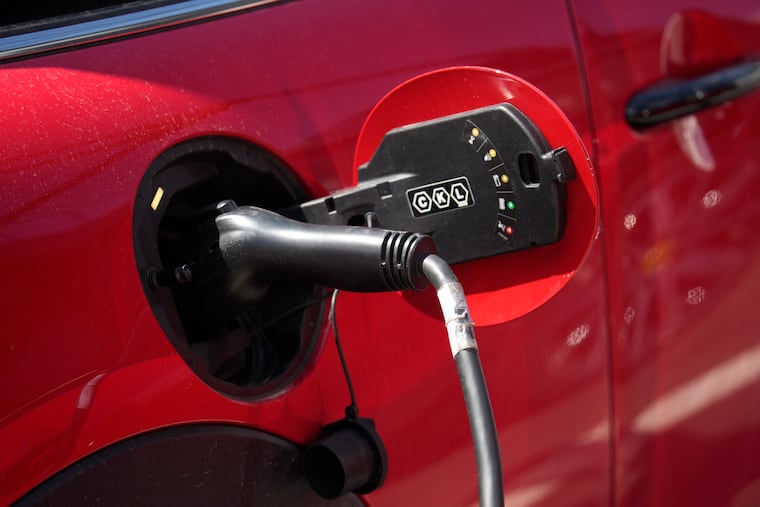Electric vehicle tax in Pennsylvania would punish drivers for being responsible
Government policy should incentivize behaviors that help our communities and discourage behaviors that harm them. This regressive tax does the exact opposite.

One of my scariest moments of parenthood was sitting with my 3-year-old son in the emergency room at Bryn Mawr Hospital in October 2022 while he was suffering an asthma attack. Unfortunately, I’m far from alone in the fear I felt that day. About 28,000 Pennsylvanians visit the emergency room with asthma attacks every year, and one in eight children in Pennsylvania suffers from asthma.
Poor air quality is a primary asthma culprit. Parts of Philadelphia and Pittsburgh report air quality up to three times worse than the national average, and the American Lung Association ranks air quality in the Philadelphia region among the worst in the nation.
Vehicle exhaust from cars and trucks is one of the biggest reasons for our state’s lousy air quality, accounting for about a third of Pennsylvania’s air pollution. Research increasingly shows that air pollution from vehicles not only triggers asthma attacks; dirty air can also contribute to the development of asthma in the first place.
I’m reminded of tailpipe pollution from cars every day while I wait to pick up my son from school, as I breathe in exhaust from the line of cars in front of me. I also thought about it when I learned that the Pennsylvania legislature is considering slapping its electric vehicle drivers with the nation’s highest tax at $290 per vehicle each year.
States like Texas and Alabama charge the second-highest electric vehicle fee at $200, making Pennsylvania’s proposed tax nearly 30% more expensive than the next highest state tax. Among the 29 states that charge a flat annual registration fee for electric vehicles, the average is roughly $125, less than half of the state’s proposal.
Government policy should incentivize behaviors that help our communities and discourage behaviors that harm them. This regressive tax feels like a punitive charge that does the exact opposite.
Transitioning to cleaner forms of transportation creates clear benefits: clean air and improved public health, less climate pollution, and less dependence on oil from adversarial, petroleum-producing nations that don’t share our values and commitment to democracy.
Electric vehicles also help shield families from inflation because fossil fuels have driven as much as 40% of the inflation the U.S. has experienced over the past several years, according to Moody’s.
And yet, the General Assembly seems intent on detouring electric vehicle growth right when many families are considering the switch. Electric vehicle growth is accelerating, with sales up nationwide nearly 50% through 2023’s first nine months compared with the same time frame in 2022. Some analysts believe electric vehicles have already surpassed key tipping points that will lead to mass adoption in the U.S.
Indeed, electric vehicle prices have become increasingly competitive with gas cars. Leasing an EV is now the cheapest way to get into a new car. Automakers have introduced dozens of models to meet consumer demands, opening the market to more middle-income families. And electric vehicle fuel savings are real. In Pennsylvania, it’s as much as $27 cheaper to travel 420 miles in an electric vehicle than a Honda CR-V, the state’s most popular car in 2023, according to Energy Innovation’s EV fill-up tool.
As it is, Pennsylvania does little to promote electric vehicle adoption, offering paltry incentives compared with neighboring states. Adding another barrier in the form of a high regressive annual tax will only slow electric vehicle growth by cutting into the superior economics of owning and operating an electric vehicle.
Lawmakers say the proposed $290 annual tax on electric vehicles is intended to ensure EV owners pay into the state’s road and bridge maintenance fund.
Speaking in favor of the proposal, State Rep. Kerry Benninghoff (R., Centre) said the fee was a matter of “fairness.”
I agree with Benninghoff that there is a fairness issue here, but not the way he portrays it. It’s not fair that conventional cars and trucks dump air and climate pollution into our skies, harming our kids’ health today and jeopardizing a livable climate in their future.
Thanks to technological advances, we have solutions at hand to create a cleaner, cheaper future for transportation, but those solutions only work if we don’t take steps that discourage their adoption.
Pennsylvania should be a forward-looking leader of the 21st-century clean energy economy, rather than a regressive Luddite holding back the inevitable. The state’s asthmatic children will thank us for it.
Greg Alvarez is a Bryn Mawr resident and deputy director of communications at Energy Innovation: Policy and Technology, a nonpartisan climate and energy think tank.